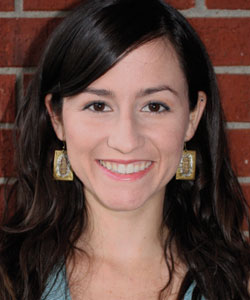Member Article
New Policy Eliminates Funding Hurdle for Promising Graduate Student

Edmarie Guzman-Velez
Edmarie Guzman-Velez studies emotions and memory in dementia such as Alzheimer’s disease specifically, looking at whether patients with dementia continue to experience emotions even when they don’t remember the event that caused the emotion. During her second year in University of Iowa’s clinical psychology training program, she submitted an application for an NSF Graduate Research Fellowship. After receiving an honorable mention for her application the previous year, Guzman-Velez and her advisor, Daniel Tranel, were almost certain she would receive the fellowship. Instead, Guzman-Velez received a notice of ineligibility. Because her proposal was classified as a clinical science proposal, her application wouldn’t even be reviewed. Guzman-Velez challenged that notice, and after the decision not to review was reversed, she received one of NSF’s coveted fellowships.
What will the NSF Graduate Research Fellowship mean for your research, your career?
I applied for the NSF Graduate Research Fellowship because I want to devote most of my time to research. I am a teaching assistant at present, and although I enjoy teaching very much, it limits the time I can spend conducting research. This fellowship will allow me to continue working on my research projects, get involved in others, and work on manuscripts for publication. This is a great opportunity to conduct state-of-the-art research that will hopefully contribute to the field of neuropsychology. I also believe that this fellowship will help me continue to grow as a scientist, and it will also connect me with other people that have similar goals.
What work will your fellowship support?
Previous research done in our laboratory has shown that patients with bilateral focal hippocampal damage can sustain the experience of an emotion even when they cannot remember the event that caused the emotion. Because patients with Alzheimer’s disease have similar neuroanatomical characteristics as patients with amnesia, we aim to explore whether patients with Alzheimer’s disease can also sustain the experience of emotion despite their lack of memory for the event that caused the emotion. This approach is novel because although there are similarities between patients with amnesia and patients with Alzheimer’s disease, they also differ in many ways. The most notable difference is that Alzheimer’s disease is a neurodegenerative disease that affects the whole brain. We are also conducting structural MRI to explore the relationship between different brain structures as well as emotions and memory. This work will not only provide new information about the relationship between the brain and behavior, but it will potentially emphasize the importance of treating this population with much respect. Our actions can have a lasting effect on these patients even when their memory is impaired.
What was it like getting rejected and then being reconsidered?
It was somewhat disappointing, but I knew it was a very competitive fellowship. Therefore, I just tried to take the reviewers’ comments into consideration and worked hard to improve my application. I was very nervous when I applied this time because I knew it was my last chance. Yet it all worked out! I was extremely excited when I heard the news. This is a great opportunity.
Final thoughts?
This experience really showed how important it is to persevere. I applied last year for the first time and worked for a whole year trying to improve my application. I’m also glad I decided to share my disagreement with their decision about my work not being eligible. It all paid off. There are also many people that have been very supportive throughout the whole process. My mentor, Daniel Tranel; members of my lab, Justin Feinstein and David Warren; Teresa Treat, Rachel Casas, and other faculty members; and student colleagues were all incredibly supportive throughout the whole process. I really think that NSF made a good decision. Great research is going to be supported by this fellowship.
*This article has been updated to correct the reason that Guzman-Velez’s proposal was initially rejected by NSF.





Comments
Edmarie,
Nice work! persistence and passion combined for success. We like your study choice very much. It is a frequently asked question by care givers and families. My company is in Atlanta, GA and we have been focused on older adult life improvement through assistive technology. Like you, we use reminiscence and music therapy to engage adults with dementia. If you would like to work together some time I can connect you with our head of research.
Best wishes for success
Dan Pompilio
APS regularly opens certain online articles for discussion on our website. Effective February 2021, you must be a logged-in APS member to post comments. By posting a comment, you agree to our Community Guidelines and the display of your profile information, including your name and affiliation. Any opinions, findings, conclusions, or recommendations present in article comments are those of the writers and do not necessarily reflect the views of APS or the article’s author. For more information, please see our Community Guidelines.
Please login with your APS account to comment.